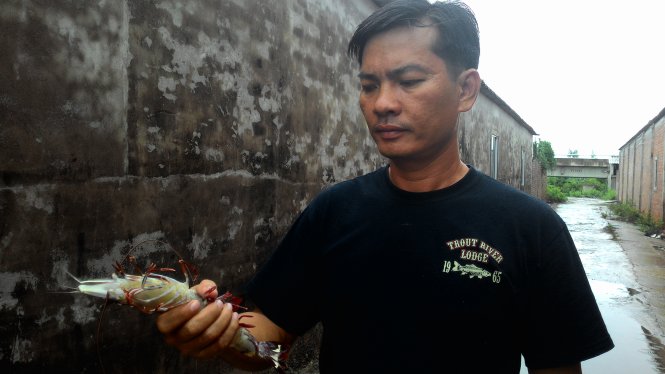Over the past 20 years or so, Vietnam’s southwestern seas have heated up with relentless hunts for breeding giant tiger prawns which have spurred locals’ fortune-making dreams.
The breeding “tom su” (giant tiger prawns), weighing around 250 grams, generally fetch VND4-6 million (US$183-275) apiece.
The smallest, poorest-quality prawns also sell for at least around VND1 million ($46) each.
A healthy parent prawn can breed and produce young four times every 12 days, with around one million eggs in each clutch.
Part of the egg batch will hatch, earning breeders profits which are dozens of times more than their initial investment in the parent crustacean.
Therefore the scramble for healthy parent prawns at the Rach Goc estuary, off Ngoc Hien District in the southernmost province of Ca Mau, has been mercilessly ferocious.
The area is home to the only “trading floor” of the much-wanted prawn.
On a recent typical night, the waters surrounding Hon Chuoi Islet near Rach Goc teemed with commotion, with scores of fishing and trading ships docking, and fishermen and traders yelling to one another on their walkie-talkies.
The spreading news of a ship weighed down with a bumper catch caused quite a hubbub among fishermen on other ships.
The spotlight ship went “invisible,” however, as its owner was afraid the envious colleagues would pinpoint the coordinates and pack the area for their piece of the cake.
Some ship owners even assigned their men to spy on the ship’s conversations with trading boats, or to the mainland in order to steal the information.
Though the hunting season is drawing to an end, activity seems to never let up.
The prawn ‘mine’
The rush began nearly 20 years ago, when Ba Tiep, a veteran fisherman in the neighborhood, treated some of his guests with a dishful of boiled wrist-size tiger prawns.
The excited guests, who raised prawns in Nha Trang, which is the resort city of Khanh Hoa in the south-central region, exclaimed that the dish was worth some VND100 million ($4,582 now).
To Tiep’s astonishment, the guests disclosed that the prawns they were treated to were ranked as “super prawns.”
A parenting prawn weighing around half a kilogram fetched at least dozens of million apiece (VND1 million is equivalent to $46).
The guests then enlightened Tiep that instead of selling his crustaceans for their flesh as he used to, he should keep the prawns alive and sell them to breeding centers at rates which were dozens or even 100 times as much as those for flesh prawns.
During the years between 1996 and 2006, the size of the Mekong Delta’s prawn raising areas surged fivefold from less than 100,000 hectares.
The sea-dwelling animal quickly generated some billion dollars every year for coastal provinces in the delta.
As prawn raising blossomed, a tricky problem was where to seek huge supplies of young prawns to sustain the vast farms.
Farmers in the Mekong Delta would then purchase their young prawns mostly from farms located in the south-central region, which was seeing the resource drain or even become depleted altogether.
As soon as the news of “super prawns” appearing in Rach Goc circulated, farm owners from such south-central provinces as Khanh Hoa, Ninh Thuan and Binh Thuan, and the southern province of Ba Ria-Vung Tau, wasted no time in thronging the then secluded estuary.
Rach Goc has since become the country’s largest supplier of parent tiger prawns, with its “trading floor” drawing farmers even from provinces and cities in the north.
“But for the parent prawns here, we would perhaps face a crisis regarding shrimps for breeding purposes,” Huynh Van Dung, the owner of a breeding prawn trademark in the area.
Many fishermen in Bac Lieu Province in the Mekong Delta have made a fortune thanks to fishing for and trading young prawns, but a number have also suffered whopping losses.
Sau Tuoi, an influential angler in the neighborhood, said schools of prawns only thrive in deep waters boasting abundant prey.
The schools are not fixed either, but span across the waters surrounding Hon Khoai and Hon Chuoi to the southwest.
“Pinpointing the schools does not guarantee success. Following the catch, keeping the prawns healthy enough to breed is also a major challenge, which requires hard-earned experience, including using specially-designed nets and appropriate net casting timing,” Tuoi divulged.
Gorgeous-looking prawns, which look just like phoenixes, are quite hard to come by.
Fishermen stay put on their ships for days on end.
Nguyen Cong Tam, a 28-year-old local fisherman, said his ship sometimes does not reach the mainland during Tet (Lunar New Year) or public holidays.
Necessities are transported to the ships on trading boats. Fishermen even divide their money amidst the deep open sea.
The hunter usually becomes the hunted, as ships hunt for prawns and also get preyed on by fellow ships.
Steersman Lam Banh Dua said soon after a bumper catch, his ship is usually besieged by other ships hungry for a similar catch.
He added they now talk using secret codes.
The rush for parent prawns, however, has also given many a serious cause for concern.
“Constantly cornered and fished for, parent prawns are dwindling fast in numbers, with good-sized ones disappearing altogether,” seasoned angler Tuoi said concernedly.
He is worried that the “prawn mine” in the area will peter out just as the reservoir in the south-central coastal areas did.
Tuoi said parent prawns have recently been imported, but the supply cannot compare with or replace that from Rach Goc.
The weather-beaten angler is apprehensive that the prawn pool in his neighborhood will become depleted, just as some other aquatic breeds in the area did.
Like us on Facebook or follow us on Twitter to get the latest news about Vietnam!



















































